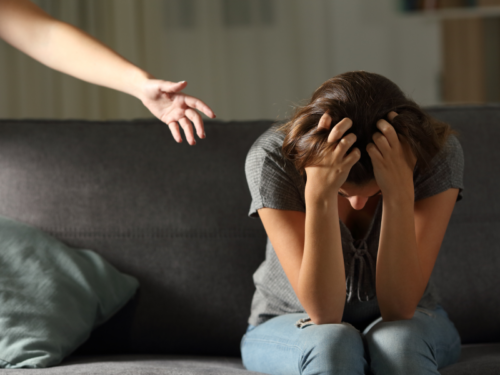
Table of Contents
These Are The Best Therapies for OCD, According to Therapists

Written By: Sarah Fielding

Clinically Reviewed By: Dr. Don Gasparini
October 17, 2023
6 min.
Managing OCD symptoms is possible with the correct treatment, therapists say. Keep reading to learn about the best therapy and medication options for OCD.
Learn more about our Clinical Review Process
Table of Contents
Obsessive-compulsive disorder (OCD) is characterized by obsessions and compulsions, with the first tending to cause the latter. “Obsessions are unwelcome, distressing, and enduring thoughts, images, or urges that individuals grappling with OCD find challenging to manage,” says psychotherapist Angela Ficken. In turn, compulsions are often ritualistic attempts to alleviate or push these obsessions away.
OCD symptoms often appear in children ages eight to 12 or people in their late adolescence to early adulthood, the International OCD Foundation reports. Overall, about one in 200 (about 500,000) children and teens live with OCD across the United States. A mental health professional diagnoses OCD using questionnaires, tests, and guidance from the Diagnostic and Statistical Manual of Mental Disorders (DSM-5)—the first edition to class the condition under obsessive-compulsive and related disorders and not anxiety disorders.
Like any mental health disorder, OCD exists on a wide spectrum, says Ficken. People sometimes have mild symptoms, but obsessions and compulsions can also be time-consuming and disruptive, interfering with relationships, work, and other social connections. Regardless of where you land on the spectrum, there are many evidence-based treatments for OCD. Keep reading to learn about the best therapy and medication options for OCD, according to several mental health professionals.
What are the different kinds of treatments for OCD?
OCD treatment plans can vary from person to person, but therapy can be an invaluable treatment option for many. Therapy can benefit people experiencing OCD at any point, but seeking help and developing coping mechanisms early on can prevent the mental health condition from worsening, says Ficken. Here are the various forms of OCD treatment to consider.
Exposure and Response Prevention (ERP)
Exposure and response prevention (ERP), a technique within CBT, is commonly used for OCD treatment. Instead of momentarily removing an obsession with a compulsive action, ERP involves directly confronting your fear under the safety and care of a mental health professional.
The idea is that, over time, your concerns and anxieties should shrink, and your confidence in coping with these situations should increase. Your brain gets rewired into living with and moving on from the obsessions without using compulsive behaviors as a temporary assurance.
You don’t need to worry, though, about trying to break compulsions in week one. “The primary focus when starting therapy for OCD is building effective coping skills, which is why you start with CBT and mindfulness work,” says Ficken. “You want to learn how to challenge the OCD thoughts and behaviors before doing any actual exposure work.” A mental health professional will introduce ERP when they believe you have a solid foundation.
Acceptance and commitment therapy (ACT)
You might find yourself frustrated or suppressing emotions when an obsession rears its head. Acceptance and commitment therapy (ACT), another option for coping with OCD, is all about — no surprise here — accepting these thoughts instead. No, this doesn’t mean accepting them and diving deep into obsessions and compulsions. Instead, it centers on acknowledging that these thoughts exist, but they don’t have to control your values or actions.
ACT practitioners might encourage you to explore mindfulness techniques as a way to connect with the present moment and observe thoughts without attaching yourself to them. “Mindfulness-centered therapies offer valuable support for individuals with OCD by fostering increased awareness of their thoughts and emotions,” says Ficken. “Through these practices, individuals can cultivate healthier and more adaptive responses to their thoughts and feelings.”

Personalized OCD treatment from home.
Learn today if our virtual IOP could help support your OCD.
Cognitive behavioral therapy (CBT)
Mental health professionals consider cognitive behavioral therapy (CBT) to be one of the best types of OCD therapy. This talk therapy is an evidence-based approach focused on reworking negative thought patterns into more rational, beneficial ones. With the help of a mental health professional, you can learn which beliefs and thoughts contribute to your OCD and challenge them. It can also help you cope with co-occurring disorders.
For example, obsessions can include intrusive thoughts about something bad happening to a child. In response, compulsive behavior could look like checking that the door is locked or the stove is off over and over in an attempt to ensure safety. “Logically, they often know this is not going to do anything and that their loved ones are safe, but the feeling they get is so strong and feels real that it is difficult for them to stop the thoughts and therefore the compulsive behavior,” explains Dr. Christina Geiselhart, LCWS.
According to Geiselhart, CBT enables people with OCD to disrupt or distract the brain from intrusive thoughts. “This can be something as simple as deep breathing techniques or journaling. The important thing here is to disrupt the pattern of giving in to the compulsions and realize that every time you give in to the compulsions, it will not make the thoughts and feelings go away but actually can make them stronger,” she said.
Medication
Another treatment option is OCD medication, which can benefit many people. “In my experience, I have found that a combination of medication and therapy is most successful in treating patients with OCD,” said Kiana Shelton, a licensed clinical social worker. Fluoxetine, sertraline, fluvoxamine, and clomipramine are antidepressants, formally known as selective serotonin reuptake inhibitors (SSRIs), approved for people under 18 living with OCD. They typically take between six and 12 weeks to take full effect.
Getting the most out of OCD therapy as a young person
After finding a therapist you trust and developing a personalized treatment plan that works for you, there are some other things young people can do to help make the most out of OCD therapy.

It’s helpful to discuss the role adults and friends play in young people’s experience with OCD. Ficken stresses the importance of parents and loved ones showing their support and understanding for anyone exploring OCD’s effects and treatments. It’s an ongoing journey and requires both patience for yourself and from the people around you.
Also, young people, in particular, are bombarded with mental health information on social media. While this can be helpful and break down barriers, it can also provide inaccurate information. “In today’s digital age, getting help but also getting inaccurate information is easier than ever. Don’t be afraid to ask questions from a trained professional to ensure you get the support you need,” says Shelton.
What are the pros and cons of online OCD therapy?
Pros
Cons
- Convenience
- Flexible session times
- Connect with providers beyond your area
- Requires access to a technological device
- Requires stable Wi-Fi
- Requires a confidential space
Online therapy is an incredible resource for people living with OCD and other mental and behavioral health conditions. The number one benefit of online OCD therapy? Convenience. “There is no commute to an office, flexibility for the session time, and additional opportunities for building community that may not be available in your areas,” says Shelton. Online therapy is a great opportunity to connect with a mental health professional specializing in OCD who doesn’t live close enough to see in person.
It can be very effective, but online OCD therapy — like all digital appointments — also has some cons. Unlike an in-person office visit, an online session requires access to a device and a stable internet connection, the latter of which anyone who has done a video call in the last few years knows isn’t always available, no matter how many bars of Wi-Fi you have. It also requires a safe, confidential space, which can be especially tricky when it’s teen counseling, as many young people live at home or share college dorm rooms. In some instances, people might choose to sit in cars or other seemingly more private spaces during their sessions. However, it’s crucial to ensure the area is not distracting or too noisy.
Therapy for OCD at Charlie Health
If you or a loved one are struggling with OCD, Charlie Health is here to help.
Our virtual Intensive Outpatient Program (IOP) offers more than once-weekly therapy for young people with complex mental health conditions and their families—including those dealing with OCD. Charlie Health combines group sessions, individual therapy, and family therapy from expert clinicians specializing in evidence-based treatments, many of which support the treatment of OCD.




